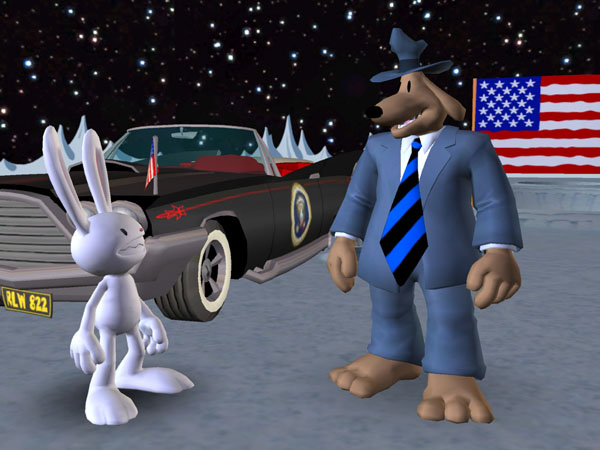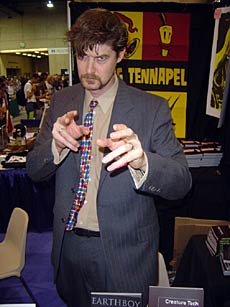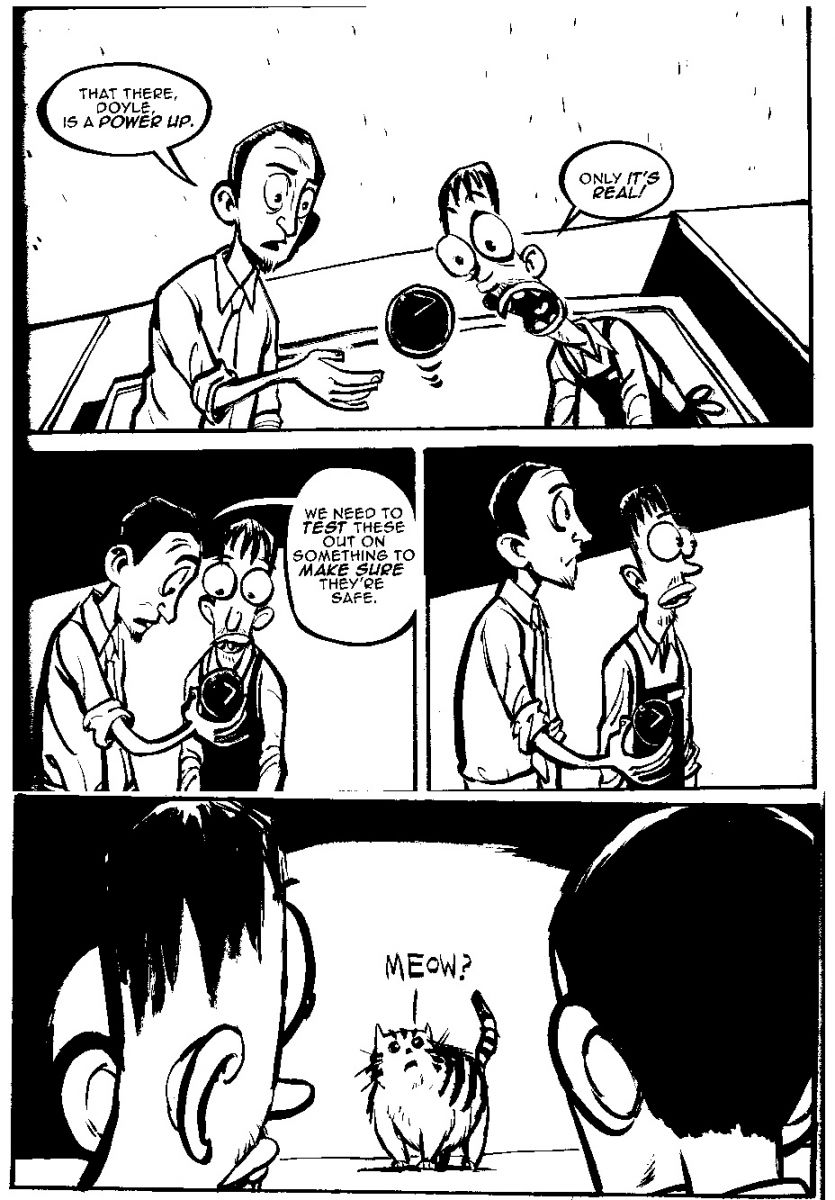In the venn diagram of fandom, the overlap of comics and video games is huge. But when it comes to comic creators, very few have made the switch to working on video games. These days when you hear of a comic creator working in the gaming industry, it’s most likely a writer handling script duties. Notable writers who’ve crossed over include Dan Slott (Spider-Man: Shattered Dimensions), Matt Fraction (Iron Man 2), Bendis (Ultimate Spider-Man), and even Brain Azzarello, who penned a unique story for the never-realeased 100 Bullets game. But what about creators who’ve made the full leap from panels to pixels, and have had a direct hand in developing and designing games? They have to exist, right? You bet! Let’s take a look at three of my favorite comic creators turned game developers.
JOE MADUREIRA
 Joe Madureira started working in comics at the ripe old age of 16, as an intern at Marvel. Three years later had his first regular penciling gig on Uncanny X-Men, rising to fame as one of the key artists during the Age of Apocalypse story line. Like most folks, AoA was my first exposure to Joe Mad and I instantly fell in love with his manga-infused drawing style. Maybe it was just my teenage sensibilities, but Madureira’s hyper kinetic style really got me amped whenever I would read one his books. So naturally when Joe left Marvel to start working on his own book, Battle Chasers, I was stoked. But Battle Chasers could never come out on time, maybe two or three issues were released per year, which started to give Joe a bad rap with comics fans (even to this day, uttering his name in a comic store will illicit a few sour faces). Finally, after four years and nine issues of Battle Chasers, Madurerira left the comics world to pursue his other passion: video games.
Joe Madureira started working in comics at the ripe old age of 16, as an intern at Marvel. Three years later had his first regular penciling gig on Uncanny X-Men, rising to fame as one of the key artists during the Age of Apocalypse story line. Like most folks, AoA was my first exposure to Joe Mad and I instantly fell in love with his manga-infused drawing style. Maybe it was just my teenage sensibilities, but Madureira’s hyper kinetic style really got me amped whenever I would read one his books. So naturally when Joe left Marvel to start working on his own book, Battle Chasers, I was stoked. But Battle Chasers could never come out on time, maybe two or three issues were released per year, which started to give Joe a bad rap with comics fans (even to this day, uttering his name in a comic store will illicit a few sour faces). Finally, after four years and nine issues of Battle Chasers, Madurerira left the comics world to pursue his other passion: video games.
 However, Joe Madureira’s path to video game success would not be an easy one. Forming company called TriLunar in 2001 with two former Black Isle Studios (Icewind Dale, Planescape: Torment) employees, Joe began working on an action-adventure called Dragonkind. Concept art from Madureira and in-progress screenshots are all that exist of Dragonkind, as TriLunar folded a little over a year later due to lack of funding. Joe would then move on to Relm Interactive, another start-up company trying to enter the massive-multiplayer online RPG market. Initially a sci-fi MMO entitled Trade Wars: Dark Millennium, Relm Interactive’s only title changed direction and title two more times, eventually hitting the market in 2007 as a fantasy-based RPG called Dungeon Runners. Faced with the unstoppable beast known as World of Warcraft, parent company NCSoft fired most of Relm Interative’s staff in 2008 and finally shut the game down altogether in January 2010.
However, Joe Madureira’s path to video game success would not be an easy one. Forming company called TriLunar in 2001 with two former Black Isle Studios (Icewind Dale, Planescape: Torment) employees, Joe began working on an action-adventure called Dragonkind. Concept art from Madureira and in-progress screenshots are all that exist of Dragonkind, as TriLunar folded a little over a year later due to lack of funding. Joe would then move on to Relm Interactive, another start-up company trying to enter the massive-multiplayer online RPG market. Initially a sci-fi MMO entitled Trade Wars: Dark Millennium, Relm Interactive’s only title changed direction and title two more times, eventually hitting the market in 2007 as a fantasy-based RPG called Dungeon Runners. Faced with the unstoppable beast known as World of Warcraft, parent company NCSoft fired most of Relm Interative’s staff in 2008 and finally shut the game down altogether in January 2010.
Luckily, Joe dodged a bullet and had jumped ship from Relm Interactive long before Dungeon Runners was released. In 2005 Joe co-founded another development company, Virgil Games, serving as the Creative Director. At Virgil Games, Joe’s talents would really begin to shine on a title called Darksiders. From the story to the character designs, Darksiders oozes Joe’s unique style, and the game would go on to be a hit in early 2010 (for more on Darksiders, check out my review over at Murmur). Madueria finally found a home at Vigil, where he’s now busy working on a Darksiders sequel. I wouldn’t expect a return to comics anytime soon (2008’s Ultimates 3 was plagued with classic MAD delays), but as long as he keeps making awesome games I guess I can forgive the fact that Battle Chasers #10 will never see the light of day.
STEVE PURCELL
 I first started paying attention to the name Steve Purcell after playing 1992’s Sam & Max Hit the Road. The dark humor, senseless cartoon violence, and memorable one-liners perpetrated by the canine shamus and his hyperactive rabbit sidekick tickled my brain in all the right places and I had to seek out more. Little did I know at the the time, Steve’s crime-fighting duo had somewhat of a cult status in the comic community and it was nearly impossible to track down any single issues. The first Sam & Max feature length comic was released in 1987 by a very small publisher, and subsequent issues were few and far between. Even later in life I couldn’t track them down, as the Sam & Max trade frequently fetched $100+ on eBay. “Why aren’t there more Steve Purcell comics,” I’d ask my local dealer. “Because he’s too busy making video games.”
I first started paying attention to the name Steve Purcell after playing 1992’s Sam & Max Hit the Road. The dark humor, senseless cartoon violence, and memorable one-liners perpetrated by the canine shamus and his hyperactive rabbit sidekick tickled my brain in all the right places and I had to seek out more. Little did I know at the the time, Steve’s crime-fighting duo had somewhat of a cult status in the comic community and it was nearly impossible to track down any single issues. The first Sam & Max feature length comic was released in 1987 by a very small publisher, and subsequent issues were few and far between. Even later in life I couldn’t track them down, as the Sam & Max trade frequently fetched $100+ on eBay. “Why aren’t there more Steve Purcell comics,” I’d ask my local dealer. “Because he’s too busy making video games.”
 Steve began working at LucasArts as an animator in 1988, where he contributed art to such classic games as Maniac Mansion, The Secret of Monkey Island, and Indiana Jones and the Last Crusade. During this time Purcell would work on Sam & Max comics on his own, producing a few full length comics and a quarterly strip in LucasArts’ fan newsletter The Adventurer. Based on the critical success of Sam & Max, LucasArts made a rare move and licensed the characters. On Hit the Road Steve could officially add “game designer” to his resume as not only did he provide art, but also wrote the script and created some of the puzzles. Hit the Road was a huge success for the company, and success means sequels right? Not so much with Sam & Max.
Steve began working at LucasArts as an animator in 1988, where he contributed art to such classic games as Maniac Mansion, The Secret of Monkey Island, and Indiana Jones and the Last Crusade. During this time Purcell would work on Sam & Max comics on his own, producing a few full length comics and a quarterly strip in LucasArts’ fan newsletter The Adventurer. Based on the critical success of Sam & Max, LucasArts made a rare move and licensed the characters. On Hit the Road Steve could officially add “game designer” to his resume as not only did he provide art, but also wrote the script and created some of the puzzles. Hit the Road was a huge success for the company, and success means sequels right? Not so much with Sam & Max.
 In 2002 LucasArts announced a sequel to much fanfare, only to unexpectedly cancel the game a few months later. In the book Rouge Leaders: The Story of LucasArts, Steve Percell comments: “We only put a few weeks into it before somebody made the call that working on an adventure-game property that didn’t belong to the company wasn’t the opportunity that made the mode business sense.” Steve would get the last laugh, however, as in 2005 the video game rights to Sam & Max reverted back to him. This allowed Steve to take his creation to his new job at TellTale games. With only an adaptation of Jeff Smith’s Bone under their belts, TellTale took Sam & Max and created an adventure-game empire, releasing the duo's latest adventures on PC, Mac, Xbox 360, PS3, and Wii. Steve Purcell has thrived at TellTale: creating art, designing adventures, and even winning an Eisner for his Sam & Max webcomic. Best of all, TellTale reprinted the Sam & Max comic collection in a sexy (and most importantly, affordable!) hardcover.
In 2002 LucasArts announced a sequel to much fanfare, only to unexpectedly cancel the game a few months later. In the book Rouge Leaders: The Story of LucasArts, Steve Percell comments: “We only put a few weeks into it before somebody made the call that working on an adventure-game property that didn’t belong to the company wasn’t the opportunity that made the mode business sense.” Steve would get the last laugh, however, as in 2005 the video game rights to Sam & Max reverted back to him. This allowed Steve to take his creation to his new job at TellTale games. With only an adaptation of Jeff Smith’s Bone under their belts, TellTale took Sam & Max and created an adventure-game empire, releasing the duo's latest adventures on PC, Mac, Xbox 360, PS3, and Wii. Steve Purcell has thrived at TellTale: creating art, designing adventures, and even winning an Eisner for his Sam & Max webcomic. Best of all, TellTale reprinted the Sam & Max comic collection in a sexy (and most importantly, affordable!) hardcover.
DOUG TENNAPEL

 Doug TenNapel is a man of many hats: artist, writer, animator, director, and even actor all account for the various creative roles he’s taken up over the years. As an animator in the early 90s, Doug worked on a few SEGA Genesis games like Jurassic Park and Ren & Stimpy before striking it big with his first solo creation, Earthworm Jim. Filled with Doug’s unique brand of quirky humor (the final boss is called Queen Slug-For-a-Butt), this 1994 platformer garnered huge success, spawning several sequels and an awesome Saturday morning cartoon. TenNappel’s next game, The Neverhood, offered a unique twist on the adventure game model. Instead of pixelated sprites and painted backdrops, The Neverhood was created entirely using Claymation. Released during the end of the adventure game era in 1996, The Neverhood was a critical success but unfortunately failed at retail.
Doug TenNapel is a man of many hats: artist, writer, animator, director, and even actor all account for the various creative roles he’s taken up over the years. As an animator in the early 90s, Doug worked on a few SEGA Genesis games like Jurassic Park and Ren & Stimpy before striking it big with his first solo creation, Earthworm Jim. Filled with Doug’s unique brand of quirky humor (the final boss is called Queen Slug-For-a-Butt), this 1994 platformer garnered huge success, spawning several sequels and an awesome Saturday morning cartoon. TenNappel’s next game, The Neverhood, offered a unique twist on the adventure game model. Instead of pixelated sprites and painted backdrops, The Neverhood was created entirely using Claymation. Released during the end of the adventure game era in 1996, The Neverhood was a critical success but unfortunately failed at retail.
But this didn’t stop TenNapel from creating, in fact only after his career in gaming did he start becoming more committed to comic books. Doug is an amazing storyteller, ever exploring the themes of family, belonging, religion, and self-discovery in his work. The man is a workhorse as well: aside from Gear (1999) and Creature Tech (2002), TenNapel has published a graphic novel per year since 2004. His latest book, Power Up, deals with struggling game designer Hugh Randolph, who brings home an experimental video game system from a yard sale… only to discover that the various power ups in the game can be extracted for use in the real world. Power Up really showcases Doug’s excellent comedic timing, and should make any gamer chuckle from start to finish.
But don’t count TenNapel out of the video game business just yet. In 2008 Earthworm Jim 4 was announced with Doug TenNapel as creative consultant. There’s also an HD remake of the original EWJ coming this year on Xbox Live. Oh, and Doug has TWO graphic novels out this year: a reprint of Creature Tech with 16 pages of bonus material from Image, and the full-color Ghostopolis from GRAPHIX due this July.
JoeMadFan.com
TellTale Games – Free demo for Mac and PC of the latest Sam & Max adventure, The Devil's Playhouse!
Josh Richardson is currently paying his dues in the video game industry and hustling comics at the same time. You can follow him on Twitter.


Truly, I am one of the aforementioned "sour faces." Oh well though. At least he’s doing what he wants.
Sigh…the LucasArts adventure games, how I miss thee. Both Purcell and Tim Schafer are two of my video gaming gods, as those LucasArts games are some of the most fun I’ve ever had playing a game. I as well love Sam & Max and have been following their latest exploits, and also own the latest compilation of their comics which I reread every now and then. Great brilliant stuff!
And now Remender is writing Bulletstorm! Can’t wait for that game.
@Anson17: Not only is Remender writing Bulletstorm, but he did a clean up run on a Warren Ellis script for one of my favorite games in the recent past Dead Space
What a great article! Way to go, Other Josh!
Ah, the heady days of LucasArts adventure games. I must’ve played through S&MHTR (which looks like a gamer tag for someone who loves to cuddle) 15 times before becoming engrossed in Grim Fandango when it came out. I’ve been really happy to see Purcell doing so well, and the renewed interest in Sam and Max means that I can get my grubby little hands on all of their incarnations. Anyone ever seen the Saturday Morning cartoon? Weird, and awesome.
@forrest
Very little of Ellis’ actually made it in to the final game. It was grreat though.
If we are talking classic LA adventure games, nothing beats Grim Fandango.
@CaseyJustice @muddi900 Grim Fandango is easily my favorite of the LucasArts adventure era. The writing, puzzles, and presentation were all top-notch. Tim Schafer is easily the funniest guy in games, and my main inspiration for wanting to get into the business.